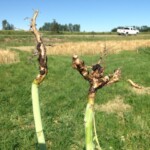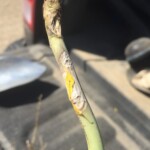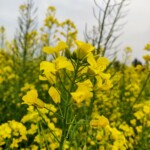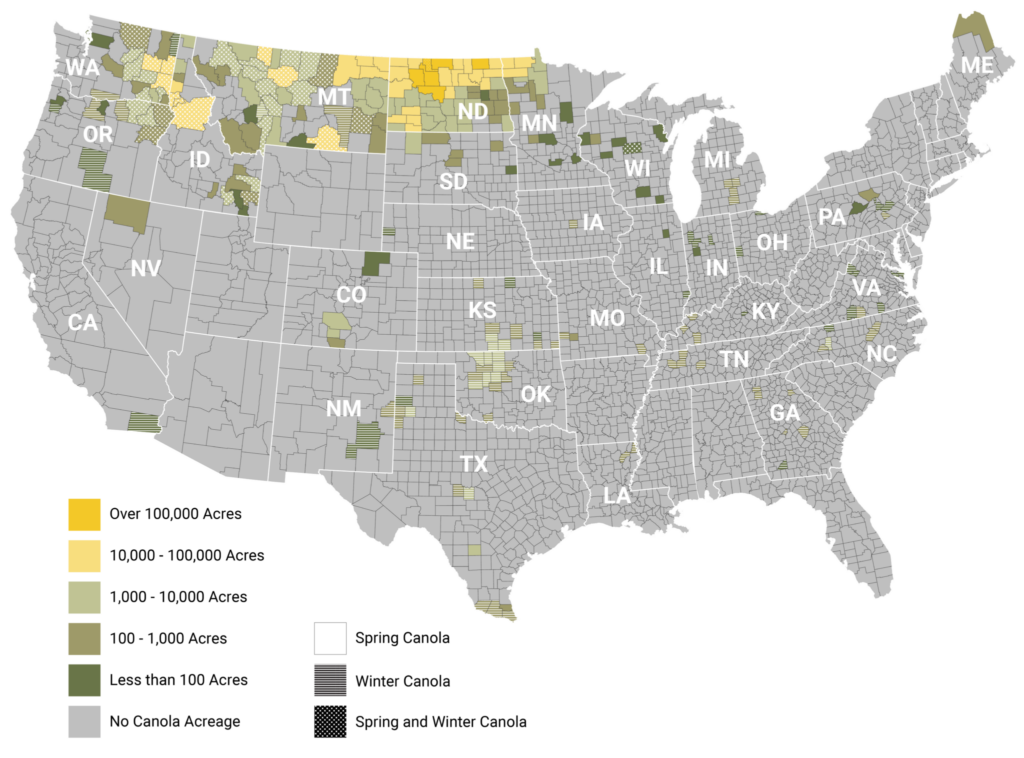 The U.S. Canola Association (USCA) met with the U.S. Department of Agriculture’s (USDA’s) Risk Management Agency (RMA) to discuss crop insurance issues the U.S. canola industry would like addressed as outlined in a July 24 letter. The RMA is reviewing all canola-related issues under a new program performance review that it will conduct every six years for each crop. This is the first review for canola, which was moved up in priority due to increased interest.
The U.S. Canola Association (USCA) met with the U.S. Department of Agriculture’s (USDA’s) Risk Management Agency (RMA) to discuss crop insurance issues the U.S. canola industry would like addressed as outlined in a July 24 letter. The RMA is reviewing all canola-related issues under a new program performance review that it will conduct every six years for each crop. This is the first review for canola, which was moved up in priority due to increased interest.
The USCA submitted comments on the Environmental Protection Agency’s (EPA’s) Vulnerable Species Pilot Project, which aims to identify early mitigation strategies for listed species that are particularly vulnerable to pesticides. Last June, the EPA released a draft paper on the Vulnerable Species Pilot, describing how it selected the species, evaluated proposed mitigations and developed an implementation plan to reduce the species’ exposure to outdoor uses of conventional pesticides. The draft also describes potential expansion of the program. This is one of several pilot projects under the EPA’s Endangered Species Act (ESA) workplan to provide earlier protections for listed species and meet ESA obligations. In 2021, the EPA began having challenges fulfilling these obligations for pesticide decisions so in April 2022, it released a workplan to address them in accordance with the Federal Insecticide, Fungicide, and Rodenticide Act.
The USDA’s Agricultural Marketing Service (AMS) is seeking nominations for individuals to join the USDA Grain Inspection Advisory Committee. The committee advises the AMS on its services and programs under the U.S. Grain Standards Act. Nominations can be made until Sept. 22, 2023. For more information, contact Kendra.C.Kline@usda.gov.
 Canola in the Pacific Northwest has seen a rapid surge in acreage due to optimal conditions, reports The Capitol Press. Regional growers are expecting some of their best crops yet. Karen Sowers, executive director of the Pacific Northwest Canola Association, notes that farmers have become more comfortable growing canola in recent years and they’ve learned about its benefits by “watching their neighbors” and “going to workshops.” Coupled with growing demand for biofuel, she believes that regional acreage could increase from 33 to 50 percent in the next 10 years.
Canola in the Pacific Northwest has seen a rapid surge in acreage due to optimal conditions, reports The Capitol Press. Regional growers are expecting some of their best crops yet. Karen Sowers, executive director of the Pacific Northwest Canola Association, notes that farmers have become more comfortable growing canola in recent years and they’ve learned about its benefits by “watching their neighbors” and “going to workshops.” Coupled with growing demand for biofuel, she believes that regional acreage could increase from 33 to 50 percent in the next 10 years.
Given the blossoming of canola in the Pacific Northwest, it’s no surprise that the USDA’s Farm Service Agency (FSA) August 2023 planting report increased the region’s acres, namely in Idaho, which ended up with nearly 100,000. The FSA calculates nearly 2.4 million total planted acres in the United States this year, an increase of 116,516 or 5 percent compared to the June 30 report of the USDA’s National Agricultural Statistics Service.

Do you know how to properly check for verticillium stripe in canola? Farmers in Manitoba and Eastern Saskatchewan have seen yield-damaging levels of the disease. Courtney Boyachek, an agronomy specialist with the Canola Council of Canada says that farmers need to cut a canola stem off at the root and look for “a grayish starburst in the cross-section” reflecting around 60% seed color change.

Clubroot continues to spread across Canada. A sampling of more than 250 fields in Alberta, Saskatchewan, and Manitoba identified 25 unique clubroot pathotypes and even new strains. Researchers are concerned about how quickly the strains can evolve and urge farmers to continue to manage disease risk. Measures include sanitizing farm equipment between fields and liming among other things.
A new report from Aimpoint Research confirms what the agricultural sector already knows: Glyphosate is critical for modern farming, enabling effective, cost-efficient and environmentally-friendly growing practices. Its report, A Future Without Glyphosate: Assessing the impacts and costs to agriculture and the environment, assesses “that if glyphosate were no longer available, markets would adapt through substitution and adjusted practices, but at a substantial cost to farmers and the environment,” including “the rapid release of additional greenhouse gases and the reversal of decades of conservation and sustainability gains.”
 Did you know the American Heart Association recognizes canola in its Heart-Check Food Certification Program? Foods approved for the program must have a qualified health claim relating to reduced risk of heart disease authorized by the U.S. Food and Drug Administration. Learn more about canola oil health claims on the USCA website.
Did you know the American Heart Association recognizes canola in its Heart-Check Food Certification Program? Foods approved for the program must have a qualified health claim relating to reduced risk of heart disease authorized by the U.S. Food and Drug Administration. Learn more about canola oil health claims on the USCA website.

Australian and Canadian researchershave discovered three genes associated with resistance to sclerotinia stem rot, which will help lead to improved disease-resistant canola varieties. Researchers from Australia’s Centre for Crop and Disease Management in collaboration with the New South Wales Department of Primary Industries and Agriculture and Agrifood Canada identified the genes. “We must develop varieties with numerous genes, each with small effects that together create crops strong enough to reduce the severity of sclerotinia stem rot for the industry, and this is exactly what we are on the path to achieving with this discovery,” says lead researcher Toby Newman.
 The National Research Council of Canada and Corteva AgriScience have been collaborating to create new varieties of canola with higher protein and decreased fiber. These attributes could boost the value of the crop and expand the use of canola meal in livestock, poultry, and fish feed.
The National Research Council of Canada and Corteva AgriScience have been collaborating to create new varieties of canola with higher protein and decreased fiber. These attributes could boost the value of the crop and expand the use of canola meal in livestock, poultry, and fish feed.

Farmers are looking for alternative feed ingredients to decrease livestock methane emissions. Research by the Canola Council of Canada found that using canola meal as the primary vegetable protein in dairy cow rations can reduce methane output by 7.5%-8.6% as well as decrease nitrous oxide levels. Results from six feeding trials with Holstein and Jersey cows confirmed these benefits as well as that milk production increased by 2.2 pounds per cow per day.
The U.S. Canola Association (USCA) will host its fall board meeting in St. Louis, Mo., Oct. 29-31 in conjunction with the National Canola Research Conference and 2023 ASA, CSSA, SSSA International Annual Meeting. Register by Sept. 20 at acsmeetings.org/register.
Save the date! The spring 2024 USCA meeting will be held in Washington, D.C., March 18-20 at the Hyatt House on The Wharf.
Want to see exactly where canola is growing in the United States? The USCA just uploaded a new canola acreage map by county on its website.

Get social with us on Instagram, LinkedIn, Facebook, Twitter and YouTube.
Want to promote your products or services to canola producers and industry members? Visit our advertising pages to find specs, deadlines and rates to advertise in this monthly e-newsletter or on UScanola.com.
Canola disease photos courtesy of the Canola Council of Canada.
 The U.S. Canola Association (USCA) met with the U.S. Department of Agriculture’s (USDA’s) Risk Management Agency (RMA) to discuss crop insurance issues the U.S. canola industry would like addressed as outlined in a July 24 letter. The RMA is reviewing all canola-related issues under a new program performance review that it will conduct every six years for each crop. This is the first review for canola, which was moved up in priority due to increased interest.
The U.S. Canola Association (USCA) met with the U.S. Department of Agriculture’s (USDA’s) Risk Management Agency (RMA) to discuss crop insurance issues the U.S. canola industry would like addressed as outlined in a July 24 letter. The RMA is reviewing all canola-related issues under a new program performance review that it will conduct every six years for each crop. This is the first review for canola, which was moved up in priority due to increased interest.

 Canola in the Pacific Northwest has seen a rapid surge in acreage due to optimal conditions, reports
Canola in the Pacific Northwest has seen a rapid surge in acreage due to optimal conditions, reports 

 Did you know the American Heart Association recognizes canola in its Heart-Check Food Certification Program? Foods approved for the program must have a qualified health claim relating to reduced risk of heart disease authorized by the U.S. Food and Drug Administration. Learn more about canola oil health claims on the USCA
Did you know the American Heart Association recognizes canola in its Heart-Check Food Certification Program? Foods approved for the program must have a qualified health claim relating to reduced risk of heart disease authorized by the U.S. Food and Drug Administration. Learn more about canola oil health claims on the USCA 
 The
The 
